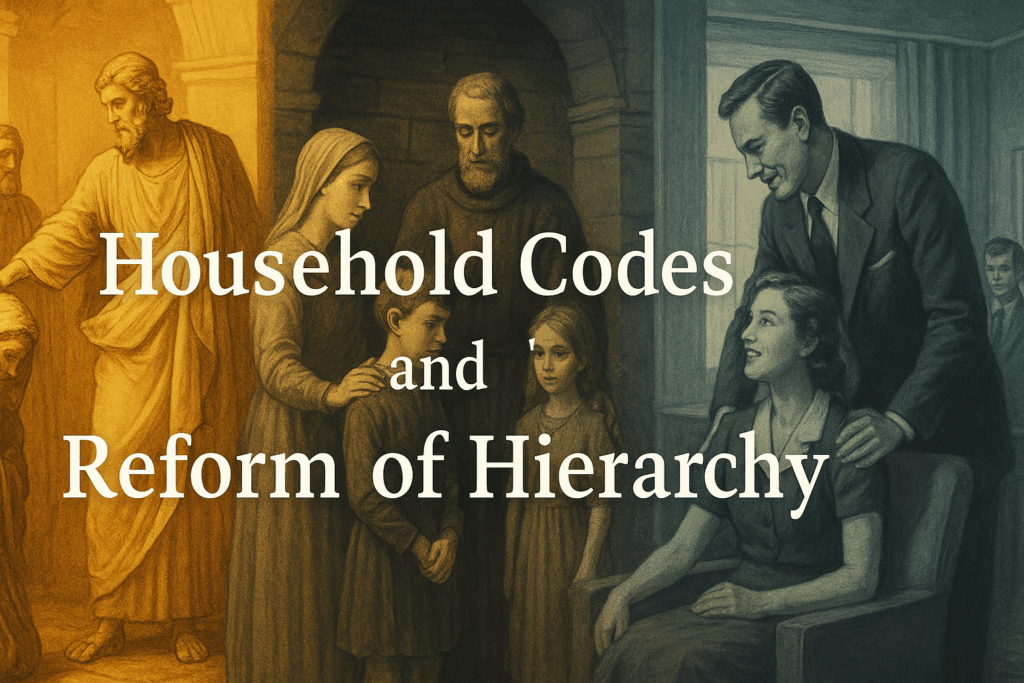One of Paul’s most debated contributions to Christian ethics is his reframing of the household codes. Ancient society relied on strict hierarchies within the household—husbands over wives, masters over slaves, parents over children—as the microcosm of social order. Paul did not abolish these structures outright, but he radically transformed them by embedding them in the ethic of mutual responsibility and love. This paradigm seeded the modern idea that all social roles are bound by obligations of care, respect, and justice, laying a foundation for modern notions of family ethics, labor dignity, and human rights.

The Scriptural Witness
Paul exhorts the Ephesian community in Ephesians 5:21–6:9 with the overarching command: “Submitting yourselves one to another in the fear of God.” This sets the tone for the household instructions that follow. Unlike pagan codes that emphasized only the duties of inferiors to superiors, Paul insists on reciprocity. Wives, children, and servants are addressed, but so too are husbands, fathers, and masters, each called to act with love, fairness, and humility. Authority is reframed not as domination but as responsibility under God.
For example, husbands are commanded to “love your wives, even as Christ also loved the church, and gave himself for it” (Ephesians 5:25). Fathers are told not to provoke their children to wrath but to nurture them (Ephesians 6:4). Masters are warned to “forbear threatening” and to remember that they too have a Master in heaven (Ephesians 6:9). Each role is thus subsumed under the ethic of mutual accountability, grounded in Christ’s lordship.
Paul echoes these themes in Colossians 3:18–4:1, where he again addresses wives, husbands, children, fathers, servants, and masters. The key addition comes in 4:1: “Masters, give unto your servants that which is just and equal; knowing that ye also have a Master in heaven.” In a society where slaves were mere property, Paul asserts their right to justice and fairness. By reminding masters of their accountability to God, Paul undermines the absolute authority of human hierarchies. Mutual obligation, not unilateral power, is the new principle of the household.
The Pauline Paradigm and Modern Ethics
Paul’s reconfiguration of the household codes planted seeds that would blossom slowly but decisively in Western ethics. By commanding mutual submission and framing authority as responsibility, Paul transformed the household into a place of reciprocal care. This vision influenced later Christian thought on marriage as a covenant of mutual love, on parenting as nurturing rather than domineering, and on labor as a partnership rather than exploitation.
The implications for modern ethics are profound. The principle of mutual obligation informs contemporary understandings of human rights and social contracts. Employers are not free to exploit workers, for they are accountable to a higher standard of justice. Parents are bound to nurture children rather than rule them harshly. Husbands and wives are seen as partners in mutual respect. Even the notion of equality under law finds a precursor here, in Paul’s insistence that earthly roles are relativized under the ultimate authority of Christ.
Moreover, Paul’s teaching prefigures the abolition of slavery. Though he did not directly call for emancipation, his insistence that masters render justice and remember their accountability to God created the moral logic that would one day challenge the institution itself. The Christian ethic of mutual responsibility thus became a quiet but persistent force in reshaping Western civilization.
Why It Matters Today
In a modern world still struggling with issues of gender equality, labor rights, and family integrity, Paul’s paradigm of mutual obligation remains vital. His teaching reminds us that power is never license for abuse but always responsibility for care. Every social role is bound by the ethic of justice, love, and accountability to God. This principle continues to shape modern laws on family, labor, and human dignity.
Modern secular ethics—our insistence on reciprocal rights and responsibilities, on equality in marriage, on fair labor standards—are indebted to Paul’s reimagining of the household. To forget these roots is to risk losing the moral foundation that insists on justice in every human relationship.
Paul’s household codes, far from being relics of a bygone age, were revolutionary steps toward a world where every role is tempered by love and every relationship defined by mutual obligation. This vision continues to undergird the moral order of our civilization.
